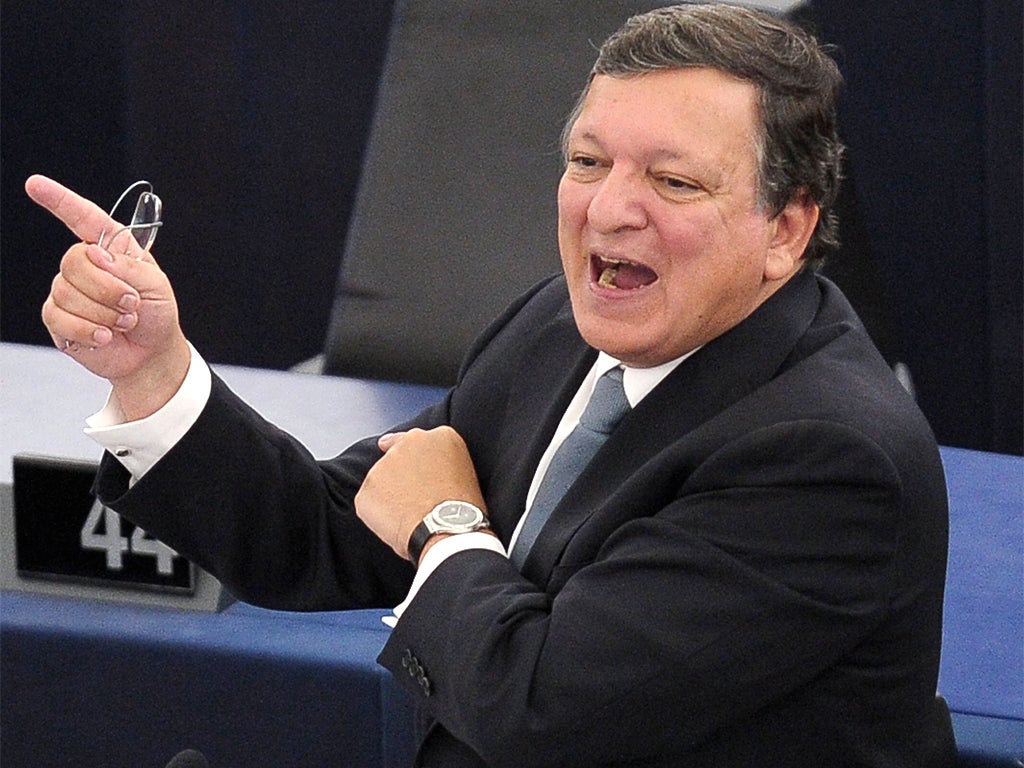Jose Manuel Barroso: Eurosceptics ‘want to drag Continent back to the trenches’
EU president Barroso singles out Ukip during outspoken address and issues warning to Tories

Your support helps us to tell the story
From reproductive rights to climate change to Big Tech, The Independent is on the ground when the story is developing. Whether it's investigating the financials of Elon Musk's pro-Trump PAC or producing our latest documentary, 'The A Word', which shines a light on the American women fighting for reproductive rights, we know how important it is to parse out the facts from the messaging.
At such a critical moment in US history, we need reporters on the ground. Your donation allows us to keep sending journalists to speak to both sides of the story.
The Independent is trusted by Americans across the entire political spectrum. And unlike many other quality news outlets, we choose not to lock Americans out of our reporting and analysis with paywalls. We believe quality journalism should be available to everyone, paid for by those who can afford it.
Your support makes all the difference.The president of the European Commission accused Eurosceptics today of wanting to take the continent back to “the trenches” of the First World War – and warned British Conservatives they risk losing elections if they copy Ukip’s rhetoric.
In his annual state of the union address, Jose Manuel Barroso praised the European Union for fighting back from the brink of economic catastrophe, and said recovery was “within sight”.
Making reference to the 2014 centenary of the start of the First World War, Mr Barroso said integration was the key to peace, and warned that any splintering of the EU risked turning the clock back. “Let me say this to all those who rejoice in Europe’s difficulties and who want to roll back our integration and go back to isolation: the pre-integrated Europe of the divisions, the war, the trenches, is not what people desire and deserve,” he told MEPs in Strasbourg.
Addressing the debate in Britain about repatriating powers from the EU, he urged nations that do not like the way Europe works to “improve it, find ways to make it stronger, internally and internationally... but don’t turn away from it”. David Cameron has promised a referendum on Britain’s EU membership in 2017 if the Tories remain in power.
Mr Barroso went even further in the debate in the European Parliament that followed his speech, specifically criticising the Tory party. Addressing Martin Callanan, the Conservative MEP for North-east England who had just called for “a new direction” for Europe, he warned that trying to win voters by aping the Eurosceptic rhetoric of populist parties could backfire at the polls.
“Increasingly your party and your group is looking like Ukip and the Eurosceptic, anti-European group, and I start to have some doubts that you are going to be elected yourself in Britain, [and] if it is not Ukip that is going to be the first force in British elections,” he said. “Because when it comes to being against Europe, between the original and the copy, people prefer the original.”
Mr Callanan retorted that “It’s a bit rich for an unelected head of the European Commission to give electoral advice”.
The Ukip leader, Nigel Farage, used his speech to reject Mr Barroso’s First World War comparisons: “Those of us who believe in national democracy do not want to take us back to the Western Front or 1914.”
A spokesman for Mr Cameron also criticised the EU president’s argument, saying: “Rather than try to second guess where the British electorate might come out, I think the right thing to do is to focus on the importance of this need for fundamental change – a flexible, adaptable, open European Union.”
Mr Barroso’s speech was his last state of the union address before his term expires next year and elections for new MEPs take place in May. There are concerns among many diplomats in Brussels that the eurozone crisis and prolonged economic downturn has increased hostility towards the EU, and that this sentiment could translate into a record showing for euroscpetic parties in the European Parliament elections in 2014.
Join our commenting forum
Join thought-provoking conversations, follow other Independent readers and see their replies
Comments